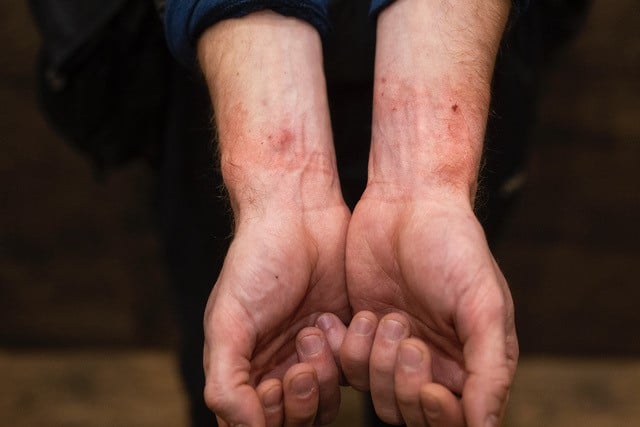Three photojournalists claim that they were “attacked” by a group of men wearing Polish army uniforms while working near Poland’s heavily guarded border with Belarus. A voice recording has now revealed that the alleged assailants shouted and used offensive language while searching them.
Poland’s defence ministry has denied the accusations, arguing that the “masked and hooded” journalists were not clearly identifiable as press members, making the intervention “fully justified”.
The incident took place in the village of Wiejki, which is close to the border but outside of the government’s heavily patrolled exclusion zone.
According to a statement published by Press Club Polska, Maciej Nabrdalik (New York Times), Maciej Moskwa (documentary collective Testigo) and Martin Divíšek (European Pressphoto Agency) were documenting the military presence near the village.
The journalists said they had introduced themselves to soldiers outside the military camp and informed them of their plans to take photographs. They said that after driving away towards Michałowo, they were stopped by men in Polish Army uniforms who ordered them out of the car, handcuffed them and searched them for an hour.
PILNE: Atak na fotoreporterów w miejscowości Wiejki
We wtorek, 16 listopada ok. godziny 16:00 grupa osób w mundurach Wojska Polskiego zaatakowała trzech fotoreporterów: @MaciekNabrdalik, Macieja Moskwę i @martin_divisek podczas wykonywania przez nich obowiązków dziennikarskich. pic.twitter.com/MDHBkqW928— Press Club Polska (@pressclubpolska) November 16, 2021
A voice recording of the incident reveals the officers shouting orders and swearing. The reporters, who were told to empty their pockets and lie on the ground, said they were “tugged” and felt “attacked”.
“Get the f*** out of the car now or I’ll drag you out!” the soldiers are heard to say in the recording. “Take everything f***ing out of your pockets and throw it on the ground, or I’ll take it out myself.”
When told that Divíšek, who is Czech, does not understand Polish, one of the soldiers replies: “Then f***ing translate for him. And that f***ing camera on the ground. Jacket off and on the ground…F***, journalists.
Nabrdalik called the officers “thugs in uniforms” and told Onet that this was the first time he had been treated in this way. “With every single action, they broke the law,” he claimed, adding that they were surprised by the intervention outside of the emergency zone, where journalists are banned from entering.
Another member of the group, Maciej Moskwa, said the uniformed men did not introduce themselves, nor give their ranks. “The situation was very stressful as they were standing behind us and told us to keep our hands high and face forwards,” said Moskwa.
He said that he had told the officers that his hands were being hurt by the handcuffs, but was told that the mark could also have been left by a watch.
The journalists also claimed that the soldiers had looked through personal messages on their phones as well as through the memory on their cameras, despite being informed about violating journalistic privileges.
The defence ministry has denied wrongdoing. In an official statement, it said that it “strongly disagreed that it was an attack” and called the intervention “fully justified”.
The ministry also argued that the soldiers were not aware that the three men, who were masked and hooded, were representatives of the press as they carried no visible identifications, nor had they put any signs on their car.
The ministry said that the men had walked along the fence of the military camp and taken photos of soldiers and equipment, and tried to leave the scene after being asked to stop. “We have to remember that the soldiers are on duty in circumstances of escalating tension…and are aware of the hybrid methods often used,” read the statement.
In response to a surge in attempts by migrants to enter the country from Belarus, the government called a state of emergency within 3 kilometres of the border for 30 days in September, which was later extended for a further two months.
As the measure expires, in a late-night session on Wednesday parliament passed a new package of restrictions limiting movement near the border. Journalists, however, are to be able to enter with special permission.
As a result of the ban, international outlets have reported from the Belarusian side. Critics say that this has allowed Minsk to control the narrative around the crisis and have called to also allow journalists into the exclusion zone.
Poland's lower house of parliament has passed a measure that will extend limits near the border with Belarus amid a deepening migrant crisis.
The current state of emergency, which bans journalists from entering the zone, will expire in a fortnighthttps://t.co/RGJ1bc3azl
— Notes from Poland 🇵🇱 (@notesfrompoland) November 17, 2021
Main image credit: Polska Press Club/Facebook

Agnieszka Wądołowska is deputy editor-in-chief of Notes from Poland. She is a member of the European Press Prize’s preparatory committee. She was 2022 Fellow at the Entrepreneurial Journalism Creators Program at City University of New York. In 2024, she graduated from the Advanced Leadership Programme for Top Talents at the Center for Leadership. She has previously contributed to Gazeta Wyborcza, Wysokie Obcasy and Duży Format.




















